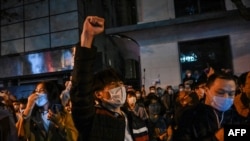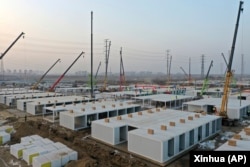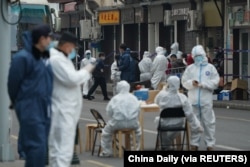On January 23, the United Nations Human Rights Council, or UNHRC, launched its Universal Periodic Review, a mechanism that will scrutinize the human rights records of 14 countries, including China.
That same day, China’s state-owned Global Times newspaper published a news report saying China’s development-oriented human rights concept is more inclusive than the Western liberal-based human rights perspective.
The piece quoted Mao Junxiang, executive director of the Human Rights Center of Central South University in China, as saying:
“In the past five years, the human rights cause in China has made remarkable progress, particularly in the areas of poverty alleviation and the successful fight against the COVID-19 pandemic.”
That is partly false.
China has indeed made considerable progress in terms of poverty alleviation in the past five years. However, China’s fight against the COVID-19 pandemic cannot be deemed as successful, given that draconian control measures have undermined people’s rights to develop and survive, which Beijing sees as core human rights.
The false part: Three years of zero-COVID
For nearly three years — from early 2020 until December 2022 — China maintained a zero-COVID strategy, a set of draconian pandemic control measures to prevent the disease’s spread. The government abandoned this signature policy of President Xi Jinping only after protests erupted across the country.
The essence of the zero-COVID policy was to keep infection cases as close to zero as possible. To achieve this, the country implemented mass PCR testing, mandatory quarantines, compulsory hospitalizations, aggressive contact tracing and citywide snap lockdowns.
These measures were not out of line at the beginning, since other countries were doing similar things to contain the then-unknown virus. The Lancet Infectious Diseases said that during the initial outbreak, China “managed to control the pandemic rapidly and effectively” while the rest of the world was losing thousands of lives to the virus daily, unable to limit its spread.
Yet even then, the Chinese government was not fully transparent in what it shared with others about the outbreak. A whistleblowing doctor who later died from COVID-19 was “educated” by the police to “not spread rumors” after he tried to share his concerns about the virus with the outside world.
While other countries saw the extremely tight health safety regulations as temporary, China stuck to zero-COVID restrictions even after vaccines became widely available.
Yanzhong Huang, a senior fellow for global health at the New York-based Council on Foreign Relations, said in a testimony before a U.S. congressional committee that zero-COVID was imposed from the top down “without any institutionalized negotiation with the people who are directly affected by the policy.”
Snap lockdowns and the mandatory "health code" system, built around an app tracking an individual’s travel and contact history directly through their smartphone, enabled the government to restrict people’s mobility at will. Infected people, even with very mild or no symptoms, were immediately isolated at designated hospitals, often against their will.
The Chinese government’s constant trumpeting of the COVID-19 danger to justify the zero-COVID policy led to widespread stigmatization of infected people. At one time, companies publicly rejected job seekers who had recovered from COVID.
With strict contact tracing, China’s government justified the wide use of intrusive surveillance techniques to monitor and track people’s movements, thereby violating people’s privacy and civil liberties. Media reports exposed local authorities who used the mandatory "health code" system to restrict the movement of people protesting on unrelated issues.
Moreover, the prolonged implementation of the zero-COVID policy has aggravated a mental health crisis in China.
“[S]tringent and persistent implementation of zero-COVID not only raises concerns over human rights and civil liberties violations, but also has the unintended result of put[ting] people’s overall health and well-being in harm’s way, thereby undermining the rights to develop and survive, which the government considers the core of human rights,” the Council on Foreign Relations’ Huang said in his congressional testimony.
Lawrence Gostin, a public health law professor at Georgetown University Law Center and director of the World Health Organization Collaborating Center on National and Global Health Law, told Polygraph.info that China’s COVID policy is “far from successful.”
“China literally shut down the country, causing immense damage to its economy while trampling civil liberties and human rights. China has censored dissidents and made it nearly impossible to express dissatisfaction with the government, including on its COVID policies,” he said.
The true part: Ending extreme poverty
In February 2021, Chinese President Xi Jinping announced that his country had ended extreme poverty.
“All 98.99 million people who are the poor rural population have been taken out of poverty,” he said at a ceremony celebrating poverty reduction in 2021.
China considers anyone in rural areas earning less than $2.30 a day living in poverty, while the World Bank defines the international poverty line as $1.90 per day.
Xi set the goal of eradicating extreme poverty when he took office in 2012. The World Bank’s 2022 joint report with the Chinese government says China’s success in alleviating poverty is driven by a strategy that focuses on the growth in agricultural productivity, progressive industrialization, rapid and managed urbanization and the expansion of infrastructure investments.
In 2013 under Xi’s leadership, China launched the Targeted Poverty Alleviation program, aimed at delivering tailored aid projects to poor areas.
The Stanford Center on China’s Economy and Institutions reported that under the program, productive private firms participated in the efforts, receiving preferential financing options from state banks to expand production.
These combined efforts led to a successful poverty alleviation campaign. Over the past 40 years, China has lifted nearly 800 million people out of poverty, according to World Bank data.









